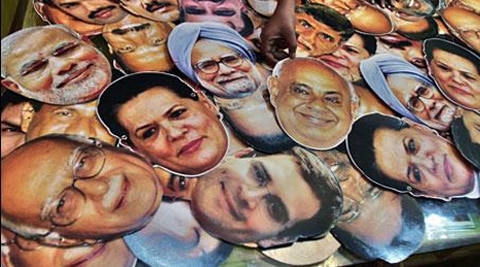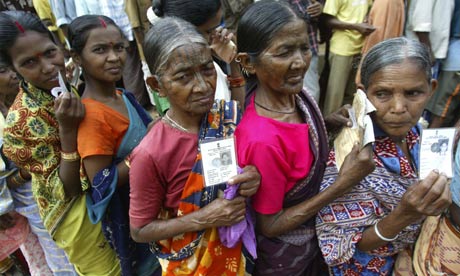Election India 2014 of the world's largest democratic nation
India's national decisions will start on April 7 and proceed nine separate dates until May 12, with outcomes anticipated that will be published on May 16, the Election Commission of India advertised Wednesday.
The vote is the world's biggest, with 814 million qualified voters set to pick 543 parts of the lower house of Parliament. This election is broadly recognized to be India's most considerable since 1977.
No party is required to win an inside and out larger part in Parliament, in spite of the fact that the Hindu nationalist Bharatiya Janata Gathering and its pioneer, Narendra Modi, revel in a significant lead in presumption surveys. What added up to 272 seats are required to choose a PM, and a blend of territorial gatherings will most likely be required to get a dominant part.
Mr. Modi went to an exchange gathering in New Delhi last week. India's Muslims Careful about Climbing Political Starmarch 3, 2014
Early surveys propose that the Gandhi family, which has overwhelmed Indian governmental issues for the majority of the nation's 67-year history, could endure its most exceedingly awful thrashing ever, with a few studies foreseeing a defeat for the family's gathering, Indian National Congress. A moderating economy and rehashed debasement embarrassments have discolored the family's picture.
Sonia Gandhi, the family matriarch and president of Congress, has endured unexplained sicknesses and is required in the not so distant future to pass administration of the party to her son, Rahul Gandhi. In any case Mr. Gandhi's dubious open proclamations and dull battling have headed numerous to ponder whether he without a doubt needs the employment. The family's reaction to the effects will be viewed nearly.
Results from Uttar Pradesh, the nation's greatest state with 80 seats, are required to be essential in deciding the election victor, and the state will vote on five separate dates. State elections in Andhra Pradesh, Orissa and Sikkim will be directed at the same time.
India's national elections are a colossal administrative undertaking including 11 million government laborers, 930,000 polling stations and 1.7 million electronic voting machines, with regulatory expenses anticipated that will surpass $645 million. The Election Commission sends work force and supplies to each corner of India utilizing autos, trains, planes, elephants, donkeys, camels and vessels, said V. S. Sampath, the head election commissioner.
"Elections free and reasonable, tranquil and participative are the life power of democracy," Mr. Sampath said on Wednesday.
Issues are standard. Voters are here and there unabashedly paid for their choices, and candidates regularly surpass their permitted consumptions, in spite of the fact that a higher using top of $1.1 million for every seat may decrease such illicit uses this time.
Regardless of boundless debasement in Indian culture, elections here are broadly acknowledged to be reasonable, and capable administrators routinely go down to smashing and sudden thrashings.
A standout amongst the most phenomenal components of the methodology is the significant turnout around India's poorest. Voting examples in India have long been intensely impacted by standing and religious affiliations, prompting decades of administrative endeavors to assuage one assembly or an alternate.
Yet in the not so distant future, both the Bharatiya Janata Party and another entrance, the Aam Aadmi Party, want to break those examples. The Bharatiya Janata Party needs its message of great legislation and improvement to have limitless request, and the Aam Aadmi Party has underlined a hostile to debasement stage that has prompted eager reactions in differing urban ranges.
The vote is the world's biggest, with 814 million qualified voters set to pick 543 parts of the lower house of Parliament. This election is broadly recognized to be India's most considerable since 1977.
No party is required to win an inside and out larger part in Parliament, in spite of the fact that the Hindu nationalist Bharatiya Janata Gathering and its pioneer, Narendra Modi, revel in a significant lead in presumption surveys. What added up to 272 seats are required to choose a PM, and a blend of territorial gatherings will most likely be required to get a dominant part.
Mr. Modi went to an exchange gathering in New Delhi last week. India's Muslims Careful about Climbing Political Starmarch 3, 2014
Early surveys propose that the Gandhi family, which has overwhelmed Indian governmental issues for the majority of the nation's 67-year history, could endure its most exceedingly awful thrashing ever, with a few studies foreseeing a defeat for the family's gathering, Indian National Congress. A moderating economy and rehashed debasement embarrassments have discolored the family's picture.
Sonia Gandhi, the family matriarch and president of Congress, has endured unexplained sicknesses and is required in the not so distant future to pass administration of the party to her son, Rahul Gandhi. In any case Mr. Gandhi's dubious open proclamations and dull battling have headed numerous to ponder whether he without a doubt needs the employment. The family's reaction to the effects will be viewed nearly.
Results from Uttar Pradesh, the nation's greatest state with 80 seats, are required to be essential in deciding the election victor, and the state will vote on five separate dates. State elections in Andhra Pradesh, Orissa and Sikkim will be directed at the same time.
India's national elections are a colossal administrative undertaking including 11 million government laborers, 930,000 polling stations and 1.7 million electronic voting machines, with regulatory expenses anticipated that will surpass $645 million. The Election Commission sends work force and supplies to each corner of India utilizing autos, trains, planes, elephants, donkeys, camels and vessels, said V. S. Sampath, the head election commissioner.
"Elections free and reasonable, tranquil and participative are the life power of democracy," Mr. Sampath said on Wednesday.
Issues are standard. Voters are here and there unabashedly paid for their choices, and candidates regularly surpass their permitted consumptions, in spite of the fact that a higher using top of $1.1 million for every seat may decrease such illicit uses this time.
Regardless of boundless debasement in Indian culture, elections here are broadly acknowledged to be reasonable, and capable administrators routinely go down to smashing and sudden thrashings.
A standout amongst the most phenomenal components of the methodology is the significant turnout around India's poorest. Voting examples in India have long been intensely impacted by standing and religious affiliations, prompting decades of administrative endeavors to assuage one assembly or an alternate.
Yet in the not so distant future, both the Bharatiya Janata Party and another entrance, the Aam Aadmi Party, want to break those examples. The Bharatiya Janata Party needs its message of great legislation and improvement to have limitless request, and the Aam Aadmi Party has underlined a hostile to debasement stage that has prompted eager reactions in differing urban ranges.


Comments
Post a Comment